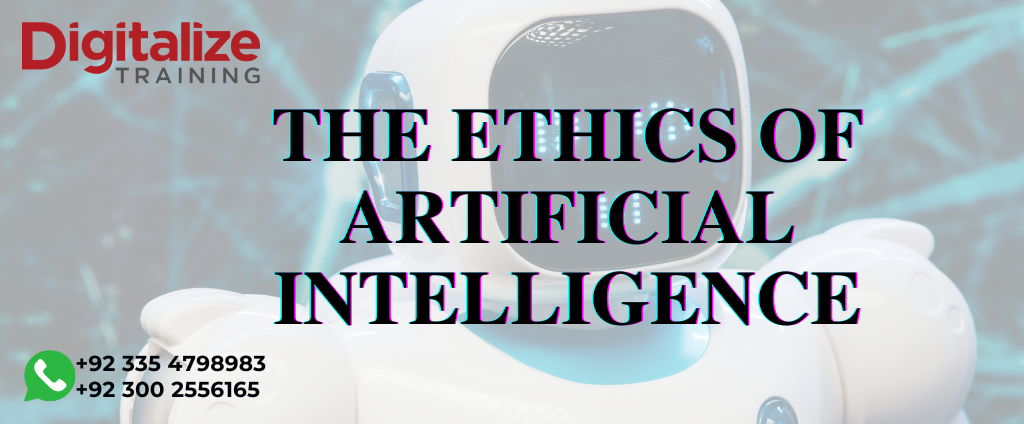
This Post discusses different Artificial Intelligence essay. for the help of students and professionals in writing the Artificial Intelligence essay OR Artificial Intelligence article.
In the first Artificial Intelligence article OR Artificial intelligence essay, we will discuss Ethics of Artificial Intelligence article. As artificial intelligence (AI) continues to revolutionize various aspects of our lives, the ethical implications of this technology have become increasingly relevant. The ethical concerns surrounding AI range from issues of bias and privacy to questions about the responsibility of developers and users. This Artificial intelligence essay will explore the key ethical considerations associated with the development & use of AI, and examine the various approaches to addressing these concerns.
In the second Artificial Intelligence essay, we will discuss ethics of Artificial Intelligence Article. The increasing artificial intelligence integration. (AI) in various fields has led to growing concerns about the ethical implications of this technology. The potential impact of AI on privacy, employment, and societal values has prompted debate on the ethical considerations of its use and development. This artificial intelligence article will examine the key ethical issues associated with AI and explore different approaches to addressing these concerns.
The Ethics of Artificial Intelligence Essay #1
Artificial Intelligence (AI) is rapidly advancing and changing the world we live in. However, with this advancement comes the need for a discussion around ethics of AI. It is important to consider the ethical implications of AI development and use, as it has the potential to significantly impact our society.
One of the key ethical considerations of AI is its impact on employment. With the rise of automation, there is a fear that AI will replace jobs, leaving many people unemployed. This could lead to significant economic and social consequences. It is important to consider the ethical implications of AI on employment and to explore ways to mitigate the potential negative impacts.
Another ethical consideration of AI is the potential for bias and discrimination. AI is only as unbiased as the data it is trained on, and if the data is biased, then the AI will be biased as well. This can lead to discrimination against certain groups, perpetuating societal biases and inequalities. It is important to ensure that AI is developed and used in an ethical and responsible way and that it does not perpetuate discrimination or bias.
Privacy is also a significant ethical concern with Artificial Intelligence. As Artificial Intelligence is used to analyze large amounts of data, there is a risk that personal information may be misused or abused. It is important to establish clear guidelines and regulations around data privacy to ensure that individual rights to privacy are protected.
Finally, there is a concern about the accountability of AI. As AI becomes more autonomous, it becomes more difficult to attribute responsibility for its actions. It is important to establish clear guidelines and regulations around the use of AI and to ensure that individuals and organizations are held accountable for the actions of their AI systems.
In conclusion, the ethics of AI are complex and multifaceted. It is important to consider the potential impacts of AI development and use on society, and to develop ethical guidelines and regulations to ensure that AI is developed and used in a responsible and ethical way. By doing so, we can harness the benefits of AI while minimizing its potential negative impacts.
The Ethics of Artificial Intelligence Essay #2
Introduction
The Ethics of AI is transforming society, but its development and use raise ethical concerns. These include bias, lack of transparency, and privacy issues. Ethical principles that prioritize fairness, accountability, and transparency are needed. Addressing these challenges requires collaboration between experts in technology, ethics, and public policy.
Risks and challenges of AI Ethics
Artificial Intelligence presents risks and challenges, including bias, lack of transparency, and privacy concerns. Ethical principles are needed to prioritize fairness, transparency, and accountability in AI development and deployment. Collaboration between experts in technology, ethics, and public policy is crucial to ensure the ethical use of AI.
Ethical Principles for the Development and use of AI
Ethical principles that should guide the development and use of AI include fairness, accountability, transparency, and respect for human autonomy. These principles ensure that AI is developed and used in a way that is responsible and respects human rights.
Addressing the Ethical challenges of AI
Addressing the ethical challenges of AI requires government regulation, industry standards, and public awareness and engagement. It also requires interdisciplinary collaboration between experts in technology, ethics, and public policy to ensure that AI is developed and used in a responsible and ethical manner.
